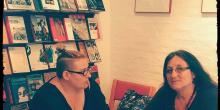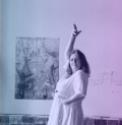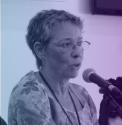Horizontal model of co-operation, Jill Greenhalgh

Horizontal model of co-operation, Jill Greenhalgh
Within our program Feminist Philanthropy we continue to publish interviews we made with our friends all over the world. Investing money, time, knowledge, is an important part of our activism and work. Voices of feminists from various spheres of social, art and political life inspire and motivate us always.
We present you Jill Greenhalgh, art director and initiator of Magdalena Project – International network of women in contemporary theatre! For 35 years already Jill is a producer, theatre director, performer and professor. She is known globally, from Europe to Australia, USA… and she is important to us, each time when we can host her in Belgrade.
It was a pleasure to talk and to listen to the answers to the questions which follow:
Why is it important to organize feminist festivals and gatherings?
If I speak from the very beginning and the very beginning reasons, it was simply that I was not seeing the work of women, made by women on the stage and I felt that this complete under-representation of the feminine vision… it was an absolute necessity politically as well as artistically – and I wanted to hear the voices of women, not always seeing women as vessels for male visions. So, this is the point of Magdalena, I think.
Why is important to invest economically in women’s human rights? Into art too….
Well, of course it’s important, one wouldn’t contest that one bit, but I think it’s the same answer that we need to rebalance the world completely and invest in the voice of women and the work of women and visions of women to bring the pendulum swing from the patriarchy back towards the matriarchy, but to bring the pendulum to equal voices, equal taking up of space. And there are some very interesting economic models, I think in India particularly, and there is compelling evidence that it is more secure to invest in women in small villages and their endeavours and their entrepreneurship because the women take much more care of the money and of the community and they repay their loans much more quickly than men do – because they think in a community kind of way – I think it is going to take a very long time for that very simple understanding to spread into a wider culture. I am no economist but I am certain that these new models of investment that are beginning to emerge can benefit particularly poor women and I think we need to really be aware of and promote these models. Economic independence for women is probably the most important thing to fight for in terms of securing human rights. I also know that the horizontal model of co-operation that has emerged in the Magdalena Project is something we really should be proud of and share. (see addendum below)
Do you think it’s important to have feminist foundations and do you know about them?
Of course I think it’s important that there are feminist foundations. What’s very interesting in Britain at the moment is that a new party has emerged, a political party, in the last elections, called the Women’s Equality Party and they just begun to form and many, many women are joining this Women’s Equality Party that exists, of course, to fight for equality for women. In our latest local elections they in fact got one percent of the votes, so it’s really a beginning and I think we need this new alternatives to the kind of neoliberal politics that pervades currently, which has just become completely toxic and dead and dry and it’s not working. So we need this alternatives and I think we have to support this Women’s Equality Party – I will support it.
What does the concept of solidarity mean to you?
I am reflecting a lot on this word ‘Solidarity’ and what it really means and how we can continue to enact it in a world that seems to want fragmentation. The Latin root is ‘solidium’ – whole sum. The commitment to being a part of the sum of people who refuse borders – who do not fear the ‘other’ but embrace the pleasure and beauty of difference and the potential of friendship. And it is meetings – like the recent Dah Teatar Anniversary gathering – that are the life blood and food of this potential. We need to meet – Facebook has become too easy and in fact isolating and I do feel we have to recognise that this over powerful neoliberalist tool, in fact, might separate us as opposed to unite. Might engender apathy as it is just too easy to make a pretence of ‘solidarity by clicking buttons – what we need is organization. The important thing is to be aware as we inhabit the margins and seek moments to meet. It is in the end the margins that bleed out to the future and contain the centre.
I think the concept of solidarity is about allowing difference, making space for difference and bringing differences together in the same space – and listening, I think that’s solidarity: listening and attempting to create opportunities for dialogue without dogma.
Addendum
I think what we have achieved in the Magdalena is a horizontal structure and strategy for organisation and survival. A trick of co-operation, which has managed, as Germaine Greer has suggested, ‘to make certain patriarchal politics irrelevant’. The horizontal working structure allows the spread of the Project, like water to flow across the surfaces – perhaps almost invisibly – seeping into the fabric of the cultural landscape, soil, and psyche as opposed to erecting clearly visible monumental vertical structures of organisation.
The vertical, traditional structures – are projectiles that go up and up and up, layer upon layer and eventually topple. And it is that fear of toppling that creates the need to sustain/maintain power – to build the walls of defense, which separate as opposed to link. I believe that the idea and wisdom of a horizontal structure, despite its obvious egalitarianism, has been universally evaded and true democracy (“a form of governance in which the supreme power is vested in the people collectively”), distorted and appropriated by the greed of ego’s scrambling for personal power and status on the vertical ascendancy.
It is permeation as opposed to proclamation that has fertilized the growth of The Magdalena Project; and it’s uncannily extensive horizontal and invisible root system seems to have pervaded theatre culture across four continents. I am not sure how. Except perhaps that need breeds.
Thanks a lot.
To see and share interviews go to http://www.rwfund.org/eng/2016/07/19/jill-greenhalgh-horizontal-model-of-co-operation/



